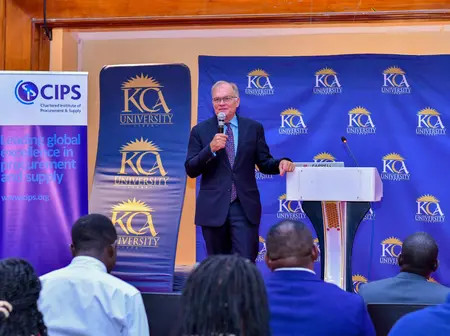The Chartered Institute of Procurement & Supply (CIPS) is set to deepen its footprint in East Africa, with plans to establish a permanent office in Kenya.
This was revealed by the global CEO of CIPS, Ben Farrell, who is currently in the country to affirm the institute’s long-term commitment to advancing procurement and supply chain professionalism across the region.
Speaking during his visit, Farrell emphasized that the world of global trade is undergoing seismic shifts, calling it a “tectonic change” driven by geopolitical instability and changing supply chain dynamics.
“The world we knew has changed. Due to the nature of global trade and supply chains, as well as the changes that are occurring. I’ve come to Kenya to reinforce our intention to help develop procurement and supply professionalism here,” he stated
He noted that CIPS, which has members in over 180 countries, has operated in Kenya since the 1990s.
Farrell said the organization’s next step is to open a permanent office in Nairobi to serve the wider East African region.
“We’re here to work right across Kenya in every sector to improve procurement capacity and ultimately prosperity both in the public and private sectors.”
One of the most urgent issues Farrell addressed is corruption in public procurement, a concern echoed throughout his meetings across Africa.
“There’s a very common theme that emerges in my conversations. It’s about the level of corruption in procurement. CIPS has global ethical standards. My recommendation to the government is that they adopt these as the minimum standard, and those who don’t meet or breach them should be blacklisted,” he said.
He added, “It’s time that a hard line is taken. I was speaking to the Speaker of Parliament, and he told me this is the richest continent in the world with the poorest people. This can be addressed by rooting out corruption. We’re here to help with that.”
Farrell also highlighted CIPS’ current initiatives, such as Health Procurement Africa, which operates in six counties in Kenya, as well as in Ethiopia and West Africa. The program focuses on equipping healthcare procurement professionals with the tools to manage supplies efficiently.
“The result of this work is improved visibility of the supply chain and a better understanding of medical care implications, particularly related to infant and maternal mortality,” he said.
“We’ve already seen infant mortality drop, maternal mortality drop, and drugs are becoming more available and affordable.”
He called for similar best practices to be applied across other sectors beyond healthcare, saying the impact could be “profound.”
Farrell also emphasized the role of emerging technologies, particularly Artificial Intelligence, in revolutionizing procurement.
“One of the great innovations we’re focused on is what AI can do for fraud detection. I’ve seen the adoption of AI globally provide a level of transparency that hasn’t been available before. Defence procurement organizations are now seeing their second, third, and even fourth-tier suppliers. They truly understand their supply chain,” he noted
He revealed that CIPS is developing an app to aggregate best global practices, where professionals in Kenya will be able to access what’s going on across the world, from Singapore to Australia, from retail to defence and follow best practice in real time.
Looking ahead, Farrell envisions a more integrated African procurement ecosystem.
He cited recent conversations at a South African conference, where leaders discussed the potential of a unified African supply chain.
“Why wouldn’t we start thinking about that. As global trade shifts, there’s every reason to think about the opportunity that Africa now has,” he added
Farrell further said that his visit and CIP expansion commitment signal a new chapter for procurement and supply chain development in East Africa.
With Kenya poised to serve as the hub for this regional transformation, the focus will now shift to building stronger local partnerships, embedding ethical standards, and leveraging innovation to drive transparency and efficiency.
“This isn’t the beginning, it’s the next step. We are here to stay, to support, and to raise the bar for procurement across East Africa. Because when procurement works, societies prosper,” Farrell affirmed.

Leave a Reply